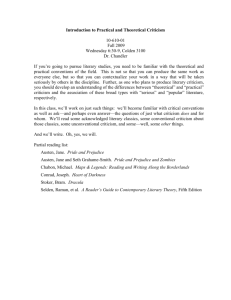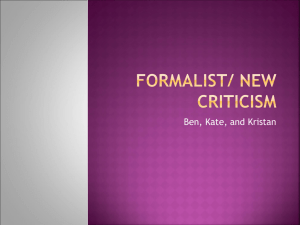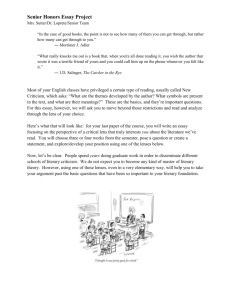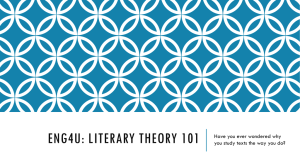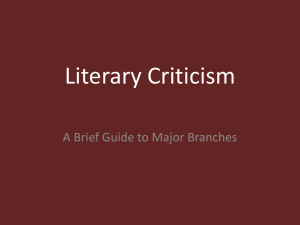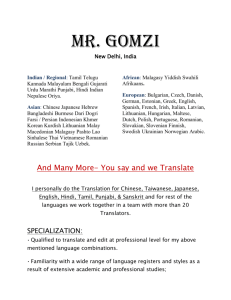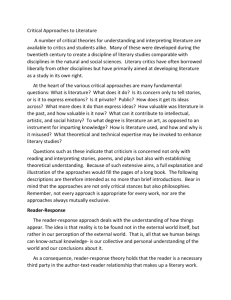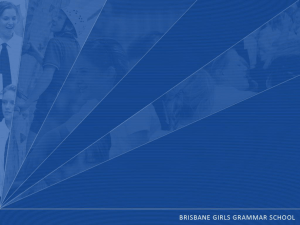Literary Critical Theory:
advertisement
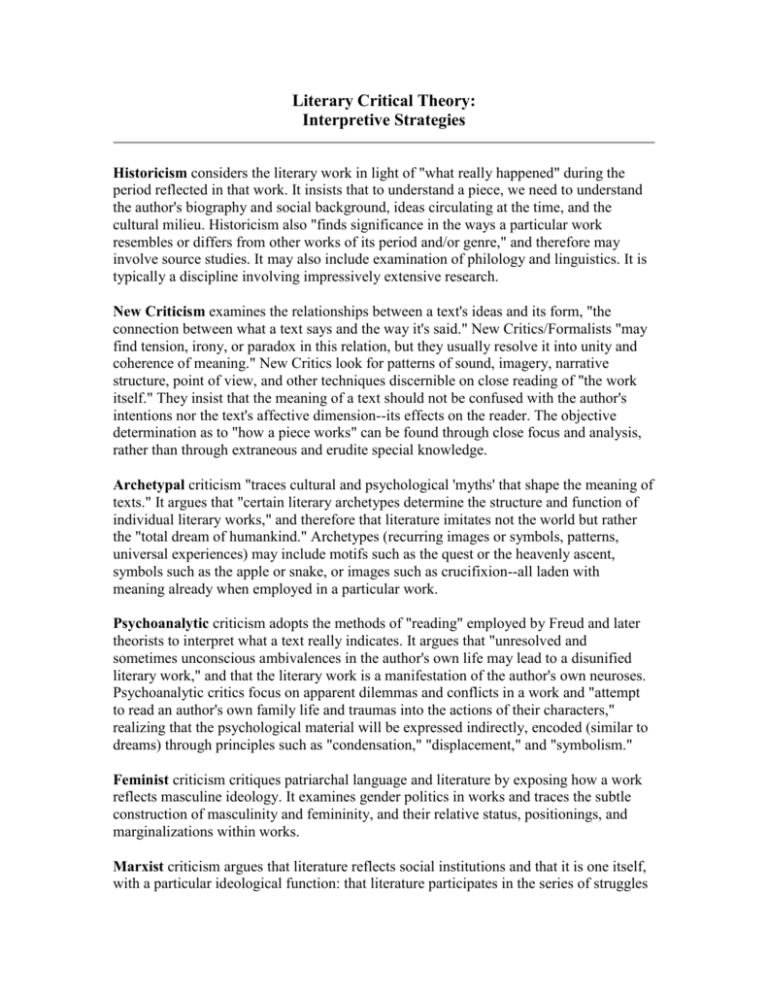
Literary Critical Theory: Interpretive Strategies Historicism considers the literary work in light of "what really happened" during the period reflected in that work. It insists that to understand a piece, we need to understand the author's biography and social background, ideas circulating at the time, and the cultural milieu. Historicism also "finds significance in the ways a particular work resembles or differs from other works of its period and/or genre," and therefore may involve source studies. It may also include examination of philology and linguistics. It is typically a discipline involving impressively extensive research. New Criticism examines the relationships between a text's ideas and its form, "the connection between what a text says and the way it's said." New Critics/Formalists "may find tension, irony, or paradox in this relation, but they usually resolve it into unity and coherence of meaning." New Critics look for patterns of sound, imagery, narrative structure, point of view, and other techniques discernible on close reading of "the work itself." They insist that the meaning of a text should not be confused with the author's intentions nor the text's affective dimension--its effects on the reader. The objective determination as to "how a piece works" can be found through close focus and analysis, rather than through extraneous and erudite special knowledge. Archetypal criticism "traces cultural and psychological 'myths' that shape the meaning of texts." It argues that "certain literary archetypes determine the structure and function of individual literary works," and therefore that literature imitates not the world but rather the "total dream of humankind." Archetypes (recurring images or symbols, patterns, universal experiences) may include motifs such as the quest or the heavenly ascent, symbols such as the apple or snake, or images such as crucifixion--all laden with meaning already when employed in a particular work. Psychoanalytic criticism adopts the methods of "reading" employed by Freud and later theorists to interpret what a text really indicates. It argues that "unresolved and sometimes unconscious ambivalences in the author's own life may lead to a disunified literary work," and that the literary work is a manifestation of the author's own neuroses. Psychoanalytic critics focus on apparent dilemmas and conflicts in a work and "attempt to read an author's own family life and traumas into the actions of their characters," realizing that the psychological material will be expressed indirectly, encoded (similar to dreams) through principles such as "condensation," "displacement," and "symbolism." Feminist criticism critiques patriarchal language and literature by exposing how a work reflects masculine ideology. It examines gender politics in works and traces the subtle construction of masculinity and femininity, and their relative status, positionings, and marginalizations within works. Marxist criticism argues that literature reflects social institutions and that it is one itself, with a particular ideological function: that literature participates in the series of struggles between oppressed and oppressing classes which makes up human history. Similar to Marx's historical theory, Marxist criticism will focus on the distribution of resources, materialism, class conflict, or the author's analysis of class relations. It examines how some works attempt to shore up an oppressive social order or how they idealize social conflict out of existence, how others offer an alternative collective life or propose a utopian vision as a solution. Cultural criticism questions traditional value hierarchies and takes a cross-disciplinary approach to works traditionally marginalized by the aesthetic ideology of white European males. Instead of more attention to the canon, cultural studies examines works by minority ethnic groups and postcolonial writers, and the products of folk, urban, and mass culture. Popular literature, soap opera, rock and rap music, cartoons, professional wrestling, food, etc. -- all fall within the domain of cultural criticism. We are focusing on it particularly as it concerns questioning the ways Western cultural tradition expressed in literature defines itself partly by stifling the voices of oppressed groups or even by demonizing those groups. We will focus on how literary tradition has constructed models of identity for oppressed groups, how these groups have constructed oppositional literary identities, and how different communities of readers might interpret the same text differently due to varied value systems. New Historicism "finds meaning by looking at a text within the framework of the prevailing ideas and assumptions of its historical era, or by considering its contents within a context of 'what really happened' during the period that produced the text." New Historicists concern themselves with the political function of literature and with the concept of power, "the complex means by which societies produce and reproduce themselves." These critics focus on revealing the historically specific model of truth and authority reflected in a given work. Reader-Response criticism "insists that all literature is a structure of experience, not just a form or meaning," and therefore focuses on finding meaning in the act of reading itself and examines the ways individual readers or communities of readers experience texts. These critics examine how the reader joins with the author "to help the text mean." They determine what kind of reader or what community of readers the work implies and helps to create. They examine "the significance of the series of interpretations the reader goes through in the process of reading." Deconstruction is a recent school of criticism which ventures beyond the structuralists' assertion that all aspects of human culture are fundamentally languages--complex systems of signs: signifieds (concepts) and signifiers (verbal or non-verbal--and that therefore a quasi-scientific formalism is available for approaching literature (and advertising, fashion, food, etc.). Deconstructionists oppose the "metaphysics of presence," that is, the claim of literature or philosophy that we can find some full, rich meaning outside of or prior to language itself. Like formalists, these critics also look "at the relation of a text's ideas to the way the ideas are expressed. Unlike formalists, though, deconstructionists find meaning in the ways the text breaks down: for instance, in the ways the rhetoric contradicts the ostensible message." Deconstructive criticism "typically argues that a particular literary, historical, or philosophical work both claims to possess full and immediate presence and admits the impossibility of attaining such presence,"-that texts, rather than revealing the New Critic's "unities," actually dismantle themselves due to their intertwined, inevitably opposite "discourses" (strands of narrative, threads of meaning). Marxism Karl Marx (1818-1883) was primarily a theorist and historian (less the evil pinko commie demon that McCarthyism fretted about). After examining social organization in a scientific way (thereby creating a methodology for social science: political science), he perceived human history to have consisted of a series of struggles between classes-between the oppressed and the oppressing. Whereas Freud saw "sexual energy" to be the motivating factor behind human endeavor and Nabokov seemed to feel artistic impulse was the real factor, Marx thought that "historical materialism" was the ultimate driving force, a notion involving the distribution of resources, gain, production, and such matters. The supposedly "natural" political evolution involved (and would in the future involve) "feudalism" leading to "bourgeois capitalism" leading to "socialism" and finally to "utopian communism." In bourgeois capitalism, the privileged bourgeoisie rely on the proletariat--the labor force responsible for survival. Marx theorized that when profits are not reinvested in the workers but in creating more factories, the workers will grow poorer and poorer until no short-term patching is possible or successful. At a crisis point, revolt will lead to a restructuring of the system. For a political system to be considered communist, the underclasses must own the means of production--not the government nor the police force. Therefore, aside from certain first-century Christian communities and other temporary communes, communism has not yet really existed. (The Soviet Union was actually state-run capitalism.) Marx is known also for saying that "Religion is the opiate of the people," so he was somewhat aware of the problem that Lenin later dwelt on. Lenin was convinced that workers remain largely unaware of their own oppression since they are convinced by the state to be selfless. One might point to many "opiates of the people" under most political systems--diversions that prevent real consideration of trying to change unjust economic conditions. Marxist Criticism According to Marxists, and to other scholars in fact, literature reflects those social institutions out of which it emerges and is itself a social institution with a particular ideological function. Literature reflects class struggle and materialism: think how often the quest for wealth traditionally defines characters. So Marxists generally view literature "not as works created in accordance with timeless artistic criteria, but as 'products' of the economic and ideological determinants specific to that era" (Abrams 149). Literature reflects an author's own class or analysis of class relations, however piercing or shallow that analysis may be. The Marxist critic simply is a careful reader or viewer who keeps in mind issues of power and money, and any of the following kinds of questions: What role does class play in the work; what is the author's analysis of class relations? How do characters overcome oppression? In what ways does the work serve as propaganda for the status quo; or does it try to undermine it? What does the work say about oppression; or are social conflicts ignored or blamed elsewhere? Does the work propose some form of utopian vision as a solution to the problems encountered in the work? Works Consulted Abrams, M.H. "Marxist Criticism." A Glossary of Literary Terms. 7th ed. Fort Worth: Harcourt Brace College Publishers, 1999. 147-153. Biddle, Arthur W., and Toby Fulwiler. Reading, Writing, and the Study of Literature. NY: Random House, 1989. Lynn, Steven. Texts and Contexts: Writing About Literature with Critical Theory. 2nd ed. NY: Longman, 1998. Murfin, Ross, and Supryia M. Ray. The Bedford Glossary of Critical and Literary Terms. Boston: Bedford Books, 1997. New Criticism New Criticism emphasizes explication, or "close reading," of "the work itself." It rejects old historicism's attention to biographical and sociological matters. Instead, the objective determination as to "how a piece works" can be found through close focus and analysis, rather than through extraneous and erudite special knowledge. It has long been the pervasive and standard approach to literature in college and high school curricula. New Criticism, incorporating Formalism, examines the relationships between a text's ideas and its form, between what a text says and the way it says it. New Critics "may find tension, irony, or paradox in this relation, but they usually resolve it into unity and coherence of meaning" (Biddle 100). New Criticism attempts to be a science of literature, with a technical vocabulary, some of which we all had to learn in junior high school English classes (third-person, denoument, etc.). Working with patterns of sound, imagery, narrative structure, point of view, and other techniques discernible on close reading of the text, they seek to determine the function and appropriateness of these to the selfcontained work. New Critics, especially American ones in the 1940s and 1950s, attacked the standard notion of "expressive realism," the romantic fallacy that literature is the efflux of a noble soul, that for example love pours out onto the page in 14 iambic pentameter lines rhyming ABABCD etc. The goal then is not the pursuit of sincerity or authenticity, but subtlety, unity, and integrity--and these are properties of the text, not the author. The work is not the author's; it was detached at birth. The author's intentions are "neither available nor desirable" (nor even to be taken at face value when supposedly found in direct statements by authors). Meaning exists on the page. Thus, New Critics insist that the meaning of a text is intrinsic and should not be confused with the author's intentions nor the work's affective dimension (its impressionistic effects on the reader). The "intentional fallacy" is when one confuses the meaning of a work with the author's purported intention (expressed in letters, diaries, interviews, for example). The "affective fallacy" is the erroneous practice of interpreting texts according to the psychological or emotional responses of readers, confusing the text with its results. To do New Critical reading, ask yourself, "How does this piece work?" Look for complexities in the text: paradoxes, ironies, ambiguities. Find a unifying idea or theme which resolves these tensions. Works Consulted Abrams, M.H. "New Criticism." A Glossary of Literary Terms. 7th ed. Fort Worth: Harcourt Brace College Publishers, 1999. 180-182. Biddle, Arthur W., and Toby Fulwiler. Reading, Writing, and the Study of Literature. NY: Random House, 1989. Lynn, Steven. Texts and Contexts: Writing About Literature with Critical Theory. 2nd ed. NY: Longman, 1998. Murfin, Ross, and Supryia M. Ray. The Bedford Glossary of Critical and Literary Terms. Boston: Bedford Books, 1997. Archetypal Criticism Archetypal criticism argues that archetypes determine the form and function of literary works, that a text's meaning is shaped by cultural and psychological myths. Archetypes are the unknowable basic forms personified or concretized in recurring images, symbols, or patterns which may include motifs such as the quest or the heavenly ascent, recognizable character types such as the trickster or the hero, symbols such as the apple or snake, or images such as crucifixion (as in King Kong, or Bride of Frankenstein)--all laden with meaning already when employed in a particular work. Archetypal criticism gets its impetus from psychologist Carl Jung, who postulated that humankind has a "collective unconscious," a kind of universal psyche, which is manifested in dreams and myths and which harbors themes and images that we all inherit. Literature, therefore, imitates not the world but rather the "total dream of humankind." Jung called mythology "the textbook of the archetypes" (qtd. in Walker 17). Archetypal critics find New Criticism too atomistic in ignoring intertextual elements and in approaching the text as if it existed in a vacuum. After all, we recognize story patterns and symbolic associations at least from other texts we have read, if not innately; we know how to form assumptions and expectations from encounters with black hats, springtime settings, evil stepmothers, and so forth. So surely meaning cannot exist solely on the page of a work, nor can that work be treated as an independent entity. Archetypal images and story patterns encourage readers (and viewers of films and advertisements) to participate ritualistically in basic beliefs, fears, and anxieties of their age. These archetypal features not only constitute the intelligibility of the text but also tap into a level of desires and anxieties of humankind. [Whereas Freudian, Lacanian, and other schools of psychological criticism operate within a linguistic paradigm regarding the unconscious, the Jungian approach to myth emphasizes the notion of image (Walker 3).] Works Consulted Abrams, M.H. "Archetypal Criticism." A Glossary of Literary Terms. 7th ed. Fort Worth: Harcourt Brace College Publishers, 1999. 12-14. ---. "Psychological and Psychoanalytic Criticism." A Glossary of Literary Terms. 7th ed. Fort Worth: Harcourt Brace College Publishers, 1999. 247-253. Biddle, Arthur W., and Toby Fulwiler. Reading, Writing, and the Study of Literature. NY: Random House, 1989. Lynn, Steven. Texts and Contexts: Writing About Literature with Critical Theory. 2nd ed. NY: Longman, 1998. Murfin, Ross, and Supryia M. Ray. The Bedford Glossary of Critical and Literary Terms. Boston: Bedford Books, 1997. Walker, Steven F. Jung and the Jungians on Myth. NY: Routledge, 2002. Psychoanalytic Criticism Psychoanalytic criticism adopts the methods of "reading" employed by Freud and later theorists to interpret texts. It argues that literary texts, like dreams, express the secret unconscious desires and anxieties of the author, that a literary work is a manifestation of the author's own neuroses. One may psychoanalyze a particular character within a literary work, but it is usually assumed that all such characters are projections of the author's psyche. One interesting facet of this approach is that it validates the importance of literature, as it is built on a literary key for the decoding. Freud himself wrote, "The dream-thoughts which we first come across as we proceed with our analysis often strike us by the unusual form in which they are expressed; they are not clothed in the prosaic language usually employed by our thoughts, but are on the contrary represented symbolically by means of similes and metaphors, in images resembling those of poetic speech" (26). Like psychoanalysis itself, this critical endeavor seeks evidence of unresolved emotions, psychological conflicts, guilts, ambivalences, and so forth within what may well be a disunified literary work. The author's own childhood traumas, family life, sexual conflicts, fixations, and such will be traceable within the behavior of the characters in the literary work. But psychological material will be expressed indirectly, disguised, or encoded (as in dreams) through principles such as "symbolism" (the repressed object represented in disguise), "condensation" (several thoughts or persons represented in a single image), and "displacement" (anxiety located onto another image by means of association). Despite the importance of the author here, psychoanalytic criticism is similar to New Criticism in not concerning itself with "what the author intended." But what the author never intended (that is, repressed) is sought. The unconscious material has been distorted by the censoring conscious mind. Psychoanalytic critics will ask such questions as, "What is Hamlet's problem?" or "Why can't Brontë seem to portray any positive mother figures?" Works Consulted Abrams, M.H. "Psychological and Psychoanalytic Criticism." A Glossary of Literary Terms. 7th ed. Fort Worth: Harcourt Brace College Publishers, 1999. 247-253. Biddle, Arthur W., and Toby Fulwiler. Reading, Writing, and the Study of Literature. NY: Random House, 1989. Freud, Sigmund. "On Dreams." Excerpts. Art in Theory 1900-1990. Ed. Charles Harrison and Paul Wood. Cambridge: Blackwell Pub., Inc., 1993. 26-34. Lynn, Steven. Texts and Contexts: Writing About Literature with Critical Theory. 2nd ed. NY: Longman, 1998. Murfin, Ross, and Supryia M. Ray. The Bedford Glossary of Critical and Literary Terms. Boston: Bedford Books, 1997. Structuralism Post-Structuralism Deconstruction STRUCTURALIST CRITICISM Structuralism is concerned not so much with what things mean, but how they mean; it is a science designed to show that all elements of human culture, including literature, are understandable as parts of a system of signs. This science of signs is called "semiotics" or "semiology." The goal is to discover the codes, structures, and processes involved in the production of meaning. "Structuralism claims that human culture itself is fundamentally a language, a complex system of signifieds (concepts) and signifiers. These signifiers can be verbal (like language itself or literature) or nonverbal (like face painting, advertising, or fashion)" (Biddle 80). Thus, linguistics is to language as structuralism is to literature. Structuralists often would break myths into their smallest units, and realign corresponding ones. Opposite terms modulate until resolved or reconciled by an intermediary third term. Structuralism was a reaction to modern alienation and despair; it sought to recover literature from the isolation in which it had been studied, since laws governing it govern all sign systems -- clothing, food, body 'language,' etc. What quickly became apparent, though, was that signs and words don't have meaning in and of themselves, only in relations to other signs and entire systems. Hence, poststructuralism. POST-STRUCTURALISM Post-structuralism contests and subverts structuralism and formalism. Structuralists are convinced that systematic knowledge is possible; post-structuralists claim to know only the impossibility of this knowledge. They counter the possibility of knowing systematically a text by revealing the "grammar" behind its form and meaning. Texts contradict not only the structuralist accounts of them, but also themselves. All signifieds are also signifiers (a car symbolizes achievement). DECONSTRUCTION Deconstructive criticism posits an undecidability of meaning for all texts. The text has intertwined and contradictory discourses, gaps, and incoherencies, since language itself is unstable and arbitrary. The critic doesn't undermine the text; the text already dismantles itself. Its rhetoric subverts or undermines its ostensible meaning. Jacques Derrida opposed the "metaphysics of presence, . . . the claim in literature or philosophy that we can find some full, rich meaning outside of or prior to language itself." The hierarchy of binaries on which this assertion rests is untenable. Privileging speech over writing = logocentrism; spoken or written words have meaning only by "differance" from other words. Deconstructive critics focus on the text like the formalists, but direct attention to the opposite of the New Critical "unities." Instead, they view the "decentering" of texts and point out incompatabilities, rhetorical grain-against-grain contradictions, undecidability within texts. There is often a playfulness to deconstruction, but it can be daunting to read too. Works Consulted Abrams, M.H. A Glossary of Literary Terms. 7th ed. Fort Worth: Harcourt Brace College Publishers, 1999. Biddle, Arthur W., and Toby Fulwiler. Reading, Writing, and the Study of Literature. NY: Random House, 1989. Lynn, Steven. Texts and Contexts: Writing About Literature with Critical Theory. 2nd ed. NY: Longman, 1998. Murfin, Ross, and Supryia M. Ray. The Bedford Glossary of Critical and Literary Terms. Boston: Bedford Books, 1997.
